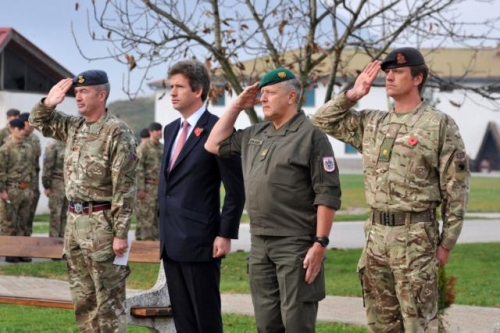12th November 2014
Honouring the dead
Remembrance week is always a poignant time of year for me, as someone who has spent most of their career supporting the UK’s Armed Forces on operations in Iraq and Afghanistan. Those who have died – friends or strangers – and the families that they left behind are never far from my thoughts.
On Sunday, I hosted a Remembrance Service which was attended by all the UK military personnel serving within the EU Force (EUFOR) here, including almost 100 troops from A Squadron, The Light Dragoons, who arrived here in July to strengthen EUFOR. Their role has been to contribute to EUFOR’s overall awareness of what is going on at the local level in different parts of the country. They have done a fantastic job, in the best traditions of the British Army, and I know that they have enjoyed meeting a huge number of people from all over the country, as they have travelled around in their distinctive Jackal vehicles.

The Light Dragoons’ association with this country began in 1993. During the course of the 1990s, the Regiment deployed here 13 times – probably more than any other unit in the British Army – first as part of the UN Peacekeeping Force, and later with IFOR. At the service on Sunday, I laid a wreath at the memorial to the 59 UK Service personnel who died bringing peace and stability to Bosnia and Herzegovina. Amongst them, we were honouring the memory of Lieutenant Richard Madden and Troopers John Kelly and Andrew Ovington of the Light Dragoons, all of whom died on 28 January 1996, when their vehicle hit a mine in Titov Drvar.

Yesterday, I attended another Remembrance Service, this time at Camp Butmir. 100 years after the armistice that ended the First World War, troops from the 22 nations that comprise EUFOR stood together and solemnly commemorated those who have died on all sides during the wars of the 20th and 21st centuries. It was particularly poignant to be in Sarajevo, the place which started the chain of events that would pitch us on different sides of the conflict, and to see British and Austrian troops – now firm allies and brothers-in-arms here in Bosnia and Herzegovina – stand together to remember their common dead.

Today, it seems quite natural that British troops should be commanded by an Austrian General. But that this is the case is to the credit of all those who worked for peace and reconciliation in Europe after the wars of the last century. The great statesmen who forged the European Union and NATO achieved what force of arms could not, and brought peace and prosperity to the continent. Next year will be the twentieth anniversary of the Dayton Peace Agreement. And it is my hope that the freshly-elected leaders of this country will show the same foresight and humanity, and work together for the benefit of all the people of this country. There could be no greater tribute to the memory of all those – military or civilian – who have died.

Excellent to see family traditions still being carried on.
Well done to all those involved. Very happy to see the Light Dragoons taking part.
We need to remember that Austrians and Brits were pushed against each other by ruling elites.
The bloke from Linz had nothing against the bloke from Manchester and vice versa.
Both probably died in trenches (fighting for a hill that was in neither Austria or UK) as teenagers, never to get married and enjoy their own kids, like other millions conscripted youngsters.
Their parents cried forever.
Some WW1 youngsters, like Adolf Hitler, got PTSD, joined extremist organizations and created another world war.
It was a tragedy of epic proportions.
We owe them a huge debt.
It took their death to realize the value of peace.